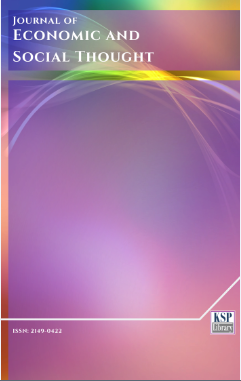Trends in globalization of select Asian countries
Abstract
Abstract. In this study we have constructed a composite index of globalization of select Asian countries during 1970-2014 by minimizing the Euclidean norm of Shapley values of indicator variables contributing to the overall index. As a consequence, the mean expected marginal contributions of constituent variables to the overall index are approximately equal and thus, the overall composite index represents the constituent variables optimally. We call this index the Almost Equal Marginal Contribution (AEMC) index. We find that AEMC index and the KOF index of globalization are highly correlated (Pearson’s r=0.982). We find that Singapore, Cyprus, Israel, Qatar, Malaysia, Jordan, Lebanon, Turkey, Kuwait, Bahrain and Japan have done very well and scored above 0.7. At the other end, Yemen, Tajikistan, Bangladesh, Bhutan, Iran, Nepal and Myanmar have scored below 0.5. Trends in globalization are increasing in general, but the rate of globalization, which accelerated after 1991, lost its momentum after 2007. Disparities in globalization, as measured by Gini coefficient over the countries under study, were more or less constant up to 1985 but after that they started declining. We have found that the index of globalization goes well with other socio-economic measures such as Economic Freedom Index, International Innovation Index, Social Progress Index, Human Development Index and Corruption Perception Index, showing high values of Kendall’s Tau and Spearman’s Rho. Its association with Democracy Index is rather weak but positive. It is almost uncorrelated with the Gender Gap Index. We observe, therefore, that globalization index is moving well with the indices of socio-economic condition in the Asian countries.
Keywords. Globalization, Synthetic index, Asian countries, Shapley values, Equi-marginal contribution.
JEL. C43, C71, F02, F60, O53.Keywords
References
Alfaro, L., Kalemli-Ozcan, S. & Vadym Volosovych, V. (2005). Why doesn’t Capital Flow from Rich to Poor Countries? An Empirical Investigation. [Retrieved from].
Becker, W., Saisana, M. Paruolo, P. & Vandecasteele, I. (2017). Weights and importance in composite indicators: Closing the gap. Ecological Indicators, 80, 12-22. doi. 10.1016/j.ecolind.2017.03.056
Dreher, A. (2006). Does Globalization affect growth? Evidence from a new index of globalization. Applied Economics, 38(10), 1091-1110. doi. 10.1080/00036840500392078
Dreher, A., Gaston, N. & Martens, P. (2008). Measuring Globalisation: Gauging its Consequences. Springer. New York.
Economist, (2011). Income equality. [Retrieved from].Economist, (2015). The rich are always with us: But we don’t like them that much. Special Report, July 16. [Retrieved from].
Economist, (2015). Democracy Index 2015: Democracy in an age of anxiety. Intelligence Unit. [Retrieved from].
Feldstein, M. & Horioka, C. (1980). Domestic Saving and International Capital Flows. Economic Journal , 90(358), 314–329. doi. 10.2307/2231790
Hindu, The (2000). Are we a soft state? [Retrieved from].
Knutsen, C.H. (2010). Investigating the Lee thesis: how bad is democracy for Asian economies? European Political Science Review, 2(3), 451-473. doi. 10.1017/S1755773910000214
Libman, A. (2008). Democracy and growth: is the effect non-linear? MPRA Working Paper. [Retrieved from].
Lucas, R. (1990). Why doesn't Capital Flow from Rich to Poor Countries? American Economic Review, 80(2), 92–96.
Maharatna, A. (2010). In resurrection of Gunnar Myrdal’s Asian drama. Mainstream Weekly, 48(18), April 24 2010. [Retrieved from].
Mishra, S.K. (2014). What happens if in the principal component analysis the pearsonian is replaced by the Brownian coefficient of correlation? SSRN. [Retrieved from].
Mishra, S.K. (2016). A note on construction of a composite index by optimization of Shapley value shares of the constituent variables. Turkish Economic Review, 3(3), 466-472.
Mishra, S.K. (2017a). Globalization under hysteresis: A study of Eastern Bloc Countries, China and India. Working Paper, No.81962. [Retrieved from].
Mishra, S.K. (2017b). Measuring degree of globalization of African countries on almost equimarginal contribution principle. Journal of Economics Bibliography, 4(4),
Mishra, S.K. & Kumar, B. (1913). Disparities in globalization of the world economies. The NEHU Journal, 11(1), 1-17.
Morgenstern, O. (1962). On the accuracy of national income and growth statistics. Econometric Research Program, Research Memo #43, U.S.A. [Retrieved from].
Myrdal, G. (1970). The Challenge of World Poverty, Penguin, London.
Myrdal, G. (1972). Asian Drama: An Inquiry into the Poverty of Nations. (Abridged version by S.S. King of The Twentieth Century Fund Study). Vintage Books, New York.
Putnam, R.D. (1995). Bowling alone: America's declining social capital. Journal of Democracy. 6(1), 65-78. doi. 10.1353/jod.1995.0002
Putnam, R.D. (2000). Bowling Alone: The Collapse and Revival of American Community. Simon & Schuster, New York.
Reddit.com (2014). Wealth Inequality in Brunei. A discussion initiated on Reddit come on 13. 2014. [Retrieved from].
The information is attributed to. [Retrieved from].
Roth, A.E. (1988). The Shapley Value. Cambridge Univ. Press, New York.
Rudra, A. (1989). Emergence of the Intelligentsia as a Ruling Class in India. Economic and political Weekly, 24(3), 142-50.
Samimi, P. (2011). Globalization measurement: Notes on common globalization indexes. [Retrieved from].
Somarriba, N., & Pena, B. (2009). Synthetic indicators of quality of life in Europe. Social Indicators Research. 94(1), 115–133. doi. 10.1007/978-94-007-0753-5_3729
States Times Review (2017). Statistics: Singapore’s income inequality among the worst in the world. [Retrieved from].
Vujakovic, P. (2010). How to Measure Globalisation? A New Globalisation Index (NGI). Atlantic Economic Journal, 38(2), 237-237. doi. 10.1007/s11293-010-9217-3
DOI: http://dx.doi.org/10.1453/jest.v4i4.1499
Refbacks
- There are currently no refbacks.
Journal of Economic and Social Thought - J. Econ. Soc. Thoug. - JEST - www.kspjournals.org
ISSN: 2149-0422
Editor: jest@ksplibrary.org Secretarial: secretarial@ksplibrary.org Istanbul - Turkey.
Copyright © KSP Library




